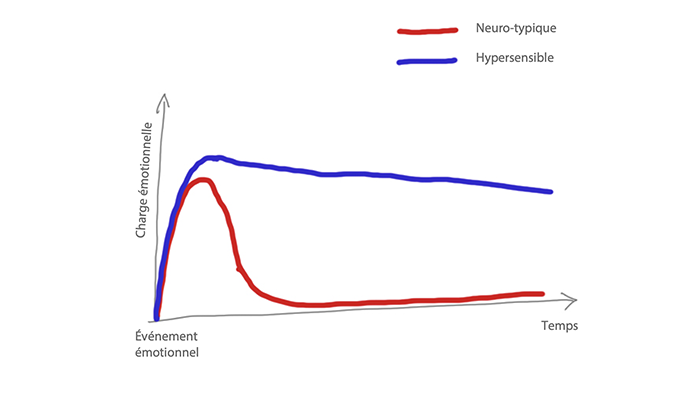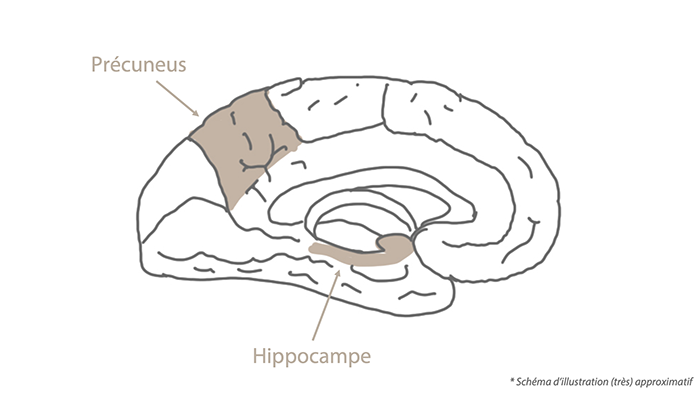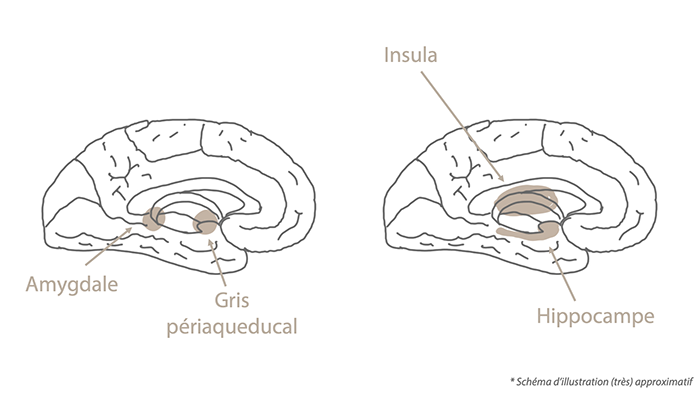En tant qu’hypersensible, j’ai toujours eu l’impression que mon cerveau ne s’arrêtait jamais. Et ça, même quand je suis au repos. Si je comprends comment mon cerveau hypersensible se repose (ou ne se repose pas plutôt) j’arriverais à trouver une solution adaptée. Je m’appelle Paul et mon haut potentiel et mon hypersensibilité ont été détectés il y a plus de dix ans maintenant. Aujourd’hui, je partage ce que j’ai appris via mon blog Connect The Dots pour aider les petits jeunes à découvrir et à mieux s’accepter.
Alors dans une vidéo précédente que j’avais faite on avait parlé de ce qu’il se passe dans le cerveau hyper sensible lorsqu’il est en marche. Comment il fonctionne lorsqu’on est réveillé et qu’il y a une émotion qui se produit. Et là je me suis demandé ce qu’il se passe quand le cerveau est au repos. Donc ce n’est pas forcément quand on dort, mais quand il y a moins de charge émotionnelle plutôt.
NB : cet article est la transcription de la vidéo ci-dessus.
L’étude scientifique sur le cerveau hypersensible
Pour faire ça, pour y répondre j’ai trouvé une étude de la revue qui s’appelle Neuropsychobiology qui a été menée par plusieurs scientifiques, dont Bianca Acevedo. Elle est assez connue dans l’univers de l’hypersensibilité. Elle est chercheuse au département des sciences psychologiques et cérébrales de l’université de Santa Barbara, et elle est auteure d’un livre assez connu sur l’hyper sensibilité qui est « The Highly Sensitive Brain ». Alors pourquoi cette étude et pas une autre ? Pourquoi est-ce qu’elle est très importante ? C’est parce que d’habitude on observe les réponses du cerveau à des stimulations externes. Et là ils ont observé ce qu’il se passe au repos, lorsque le cerveau n’est pas stimulé. On observe en fait vraiment comment la sensibilité impacte le cerveau au repos, plus tard, après le la stimulation. Et ça c’est du jamais vu.
Le protocole expérimental
Avant qu’on n’aille plus loin je vais vous dire un petit mot sur le protocole expérimental. Comment ils ont fait leur expérience ? Ils ont d’abord fait passer à des volontaires un test d’hypersensibilité pour leur donner un score d’hypersensibilité pour pouvoir (après) comparer ceux qui ne l’étaient pas et ceux qui l’étaient, pour avoir une échelle après pour pouvoir comparer. Vous pouvez vous aussi en passer un gratuitement ci-dessous si vous le souhaitez.
Une fois que les volontaires avaient leur test et leur score, on leur montrait des photos d’événements heureux, tristes ou neutres. Et ensuite, une fois qu’ils leur ont montré ces photos d’événements, ils leur ont montré des photos de visages émotifs. C’était soit les visages de leurs partenaires, soit c’était des visages d’inconnus.
Ensuite, une fois qu’ils avaient vu toutes ces photos et ces événements émotionnellement forts, ils devaient compter. On les faisait partir d’un grand nombre et ils devaient compter à l’envers de 7 par 7. …100… 93… 86… et ainsi de suite. Ça leur permettait de se concentrer sur autre chose que les émotions. Essayez de compter sept par sept à l’envers, ce n’est pas forcément hyper évident. Comme ça, les scientifiques disaient que ça allait « réinitialiser » leurs émotions et leur faire penser à autre chose. Il faut savoir que cette technique (de faire conter ou penser à autre chose) est assez régulièrement utilisée dans l’univers scientifique.
Ensuite, ils ont mis tous ces gens-là dans des IRM pour voir ce qu’il se passait dans leur cerveau.

Les résultats
Alors ils ont remarqué dans les résultats, qu’il y a eu trois choses importantes, ou trois choses principales.
1- Les hypersensibles ont un traitement en profondeur au repos
La première, c’est que chez les personnes les plus hypersensibles les données sensorielles sont traitées en profondeur et pendant longtemps. C’est à dire que les zones qui sont associées au traitement émotionnel étaient encore actives, que ce soit une heure, un jour ou un mois après le moment de l’émotion. La charge émotionnelle elle reste là, et elle est toujours analysée constamment. Plus les personnes étaient hypersensibles, plus ces zones étaient actives. Acevedo elle-même, Bianca Acevedo la scientifique, conclu elle-même sur cette partie que les cerveaux des personnes hypersensibles ne se reposent pas. Le traitement émotionnel est tout le temps-là, en font, constamment.

2- Les hypersensibles ont de plus grandes connexions avec la mémoire
La deuxième chose qu’ils ont remarqué c’est que plus la personne était hypersensible, plus elle avait un score élevé, plus il y avait d’interactions entre deux parties du cerveau qui sont le précuneus et l’hippocampe. Et cette interaction entre ces parties est utilisée pour la consolidation et la récupération des souvenirs. Donc ce qu’on peut conclure c’est que les personnes hypersensibles font plus appel à leur mémoire et ancrent plus facilement dans leur mémoire les informations sensorielles et émotionnelles. Quand on a une émotion, on va plus facilement aller chercher des souvenirs en rapport avec cette émotion. Et surtout on va faire rentrer cette émotion plus intensément dans notre mémoire.

3- Les hypersensibles sont plus stressés
Et troisième point : donc on avait vu que plus les personnes étaient hypersensibles plus elles avaient de connexions entre les deux parties précédentes. Là, au contraire, plus elles sont hypersensibles et moins il y a d’interactions entre plusieurs choses. Il y a moins d’interactions entre l’amygdale et le gris periaqueducal. Ce circuit-là est un circuit qui est crucial pour réguler l’anxiété et la douleur. Il y a également moins de connexion entre l’insula et l’hippocampe. Et cette connexion-là est impliquée dans la gestion du stress et le traitement des émotions. Acevedo conclu que les hypersensibles sont plus stressés et plus stimulés que les autres. Ça explique pourquoi les personnes hypersensibles sont généralement plus stressées et plus stimulées émotionnellement. Donc on rejoint un peu sur les résultats dont j’avais parlé dans l’étude de la vidéo précédente.

Applications
Alors qu’est-ce qu’on peut conclure de cette étude pour les personnes hypersensibles ?
L’hypersensibilité rend plus réactif
Sans surprise, les hypersensibles sont plus réactifs en général. Dans cette étude, même si les participants avaient une activité où ils ont dû compter des choses pour essayer de réinitialiser un peu la charge émotionnelle, leur cerveau a continué à traiter l’information. C’est certainement pour ça qu’on dit souvent que les personnes hypersensibles ont besoin de plus de repos. En fait, ils sont plus surchargés par des choses qui atteignent moins les autres personnes.
Les personnes hypersensibles sont plus stressées
Deuxième point : les personnes hypersensibles sont plus touchées par les situations émotionnelles et tous les événements qui vont avoir des implications au niveau de l’empathie et du stress.
Il faut prendre le temps de se reposer (et ne pas culpabiliser)
Troisième point : on sait déjà que les cerveaux hypersensibles sont plus actifs en période d’activité, ils sont aussi plus actifs même au repos. Du coup, il faut utiliser cette information pour mieux se comprendre et déculpabiliser lorsqu’on sent qu’on a besoin de se reposer. Moi je peux me sentir très vite épuisé quand il a eu beaucoup de monde autour de moi tout le temps. Du coup j’ai besoin, après un moment fort socialement, de me poser de me retrouver seul. Et cette étude me permet de « déculpabiliser » de ça parce que c’est juste que je mets plus de temps à processer toutes les informations que j’ai eues au niveau de l’empathie et de toutes mes émotions. On a des gueules de bois hypersensibles et il ne faut vraiment pas hésiter à se reposer, à prendre du temps pour soi.
L’hypersensibilité existe
Le point suivant, et qui à mon avis très important, c’est qu’il y a de plus en plus de preuves scientifiques qui confirment que l’hypersensibilité existe bien. On n’est pas juste des gens compliqués comme je le vois sur certains articles. C’est quelque chose qui existe.
Il faut apprendre à se reposer
Et enfin il faut apprendre à se reposer. C’est pas tout d’avoir des moments de repos. Pendant nos moments de repos, on est quand même en train de traiter les émotions qu’on a eues précédemment. Alors c’est important et il faut se laisser le temps. Mais il faut aussi apprendre à se reposer pour que nos moments de repos soient vraiment reposants. Pour ça (j’en parle très régulièrement) je vous conseille la méditation. Essayez même deux minutes par jour et vous augmentez petit à petit. Franchement c’est de la folie !
Conclusion
Voilà. Une petite phrase pour conclure : c’est que globalement cette étude vient encore confirmer que le cerveau hypersensible traite les informations sensorielles en profondeur (sans surprise !). On met enfin des preuves scientifiques sur ce qu’on ressent donc c’est plutôt une super nouvelle est une super chose. Il faut vraiment apprendre à se reposer parce que notre cerveau, de lui-même, n’est pas câblé pour se reposer. Trouvez votre truc, moi je parle de la méditation, ça peut être du dessin, de ce que vous voulez. Mais trouvez votre truc et apprenez à vous reposer.
Sources :
- Acevedo B., Aron A., Aron E., Marhenke R., Santander T., (Neuropsychobiology), Sensory Processing Sensitivity Predicts Individual Differences in Resting-State Functional Connectivity Associated with Depth of Processing, 2021
